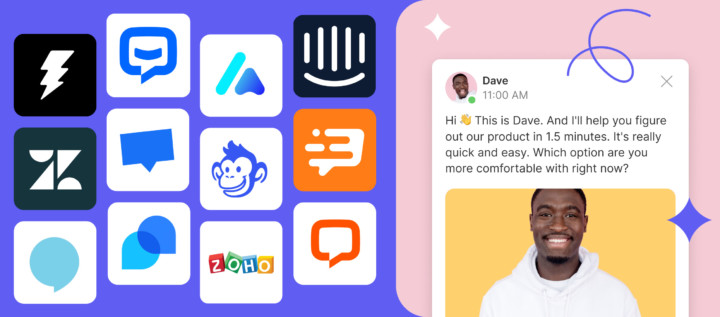What is AI for sales and marketing? Understanding its impact and applications

Introduction
In today’s business environments, AI is reshaping the way sales and marketing strategies are crafted. AI enables companies to sift through data sets and automate repetitive tasks. Improve decision-making processes, enhancing both operational effectiveness and customer interactions. Despite the advantages of AI, issues like the considerable expense of implementation and worries about protecting brand image remain prevalent. This article discusses the impact of AI in sales and marketing and delves into its practical uses, the significance of customization, and the challenges that companies encounter when integrating these innovations into their operations.
Defining AI in sales and marketing: An overview
In today’s business landscape, technology isn’t just a tool; it’s a game changer. Artificial Intelligence (AI) is at the forefront, using algorithms and machine learning to sift through massive data sets. This isn’t just about crunching numbers; it’s about automating repetitive tasks and sharpening decision-making. Think of AI as your secret weapon, giving you insights into customer behavior and trends that would take humans ages to uncover. Clara Shih hit the nail on the head when she said the real power of AI is in boosting efficiency and maintaining high standards across the board.
When it comes to sales and marketing, AI doesn’t just streamline operations — it elevates the entire sales process. But let’s be real: while the benefits of AI are clear, the road ahead isn’t without its bumps. One of the biggest hurdles? Cost. A recent survey revealed that 40% of business leaders view the investment in AI technologies as steep.
And it doesn’t stop there. Another study found that 60% of marketing professionals are concerned about the potential fallout from generative AI content—specifically, how it might tarnish a company’s brand image. This is a critical point. As businesses consider integrating AI into their sales and marketing strategies, weighing the advantages against the risks is essential. The key is to approach AI not just as a shiny new tool but as a strategic partner that requires careful consideration of its potential and pitfalls.
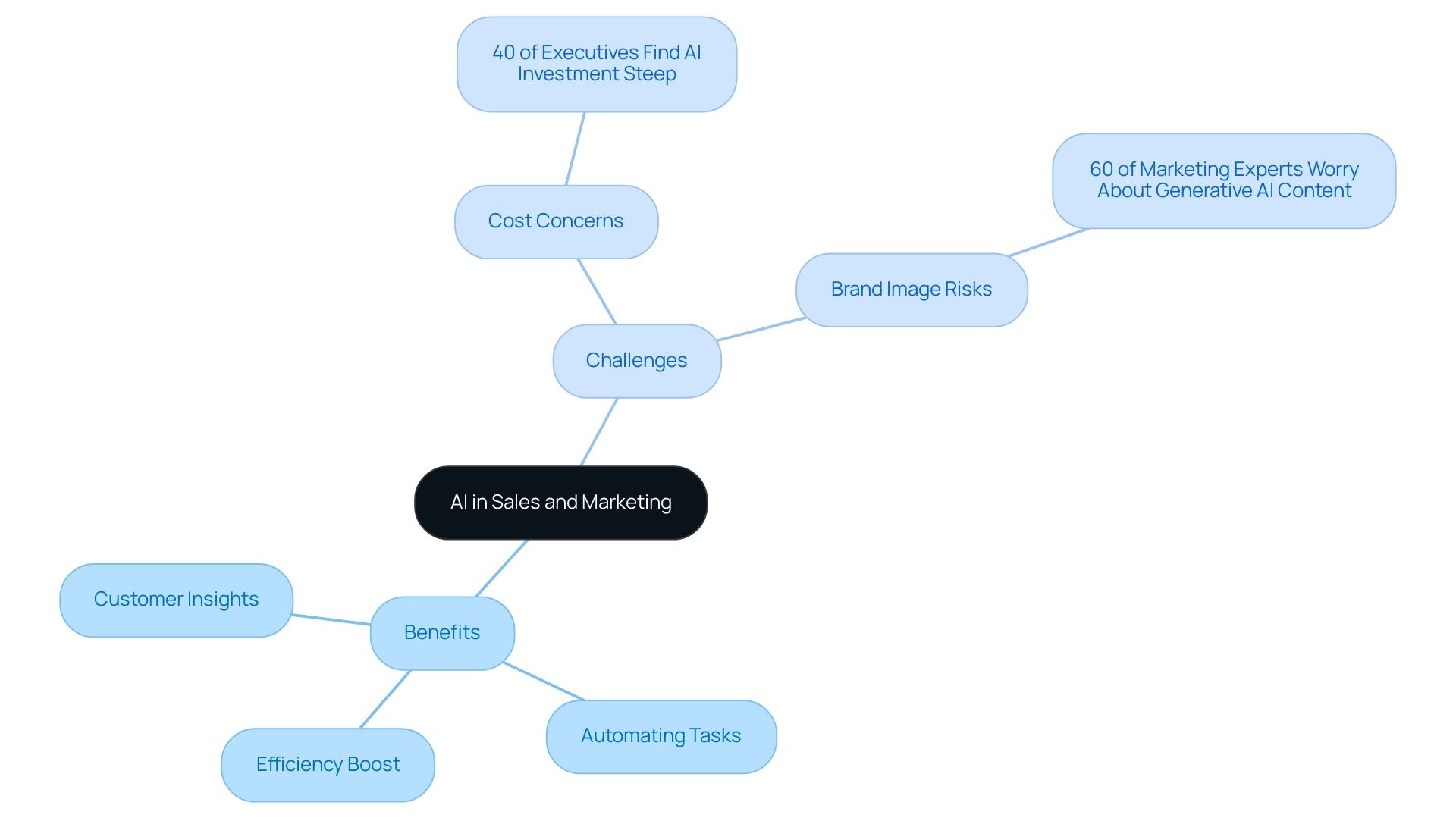
Practical applications of AI: Transforming sales and marketing strategies
AI is reshaping sales and marketing. It’s not just a trend; it’s a fundamental shift in how businesses connect with customers. One of the standout features is analytics. By diving into historical data, companies can predict future client behaviors. This isn’t just about numbers; it’s about tailoring messages and promotions to meet real needs.
Take promotional strategies, for example. Advanced analytics help businesses allocate resources more effectively and boost campaign outcomes. It’s like having a map in a dense forest — you can navigate better and avoid pitfalls. Then there are chatbots. They’ve become indispensable. By answering questions in real-time, chatbots ramp up interaction and conversion rates. Think of them as the front line of customer service, enhancing the client experience and becoming a key part of any promotional strategy.
Let’s talk about lead scoring. AI algorithms now automate this process, assessing and ranking leads based on their likelihood to convert. This means sales teams can focus on high-value clients, maximizing their outreach and productivity. But with great power comes great responsibility. A recent survey revealed that 60% of marketers worry about AI-generated content hurting their brand reputation. This isn’t just noise; it’s a wake-up call.
Accuracy and brand consistency are paramount. Constantine von Hoffman from MarTech highlights the need for businesses to adopt new technologies without losing sight of their core values. A detailed report titled ‘Issues Regarding AI Content’ shows that marketers are anxious about biases, plagiarism, and inconsistent messaging. Their top concerns?
- Accuracy
- Value
- Reliability
Looking ahead to 2024, the evolution of AI tools in sales and marketing promises even greater transformation. For small business owners, this is a pivotal moment. In 2023, evaluations showed that businesses leveraging AI in email marketing — both in Europe and the U.S. — are seeing real gains in engagement and conversion rates. If you’re not on board, you might just miss the boat.
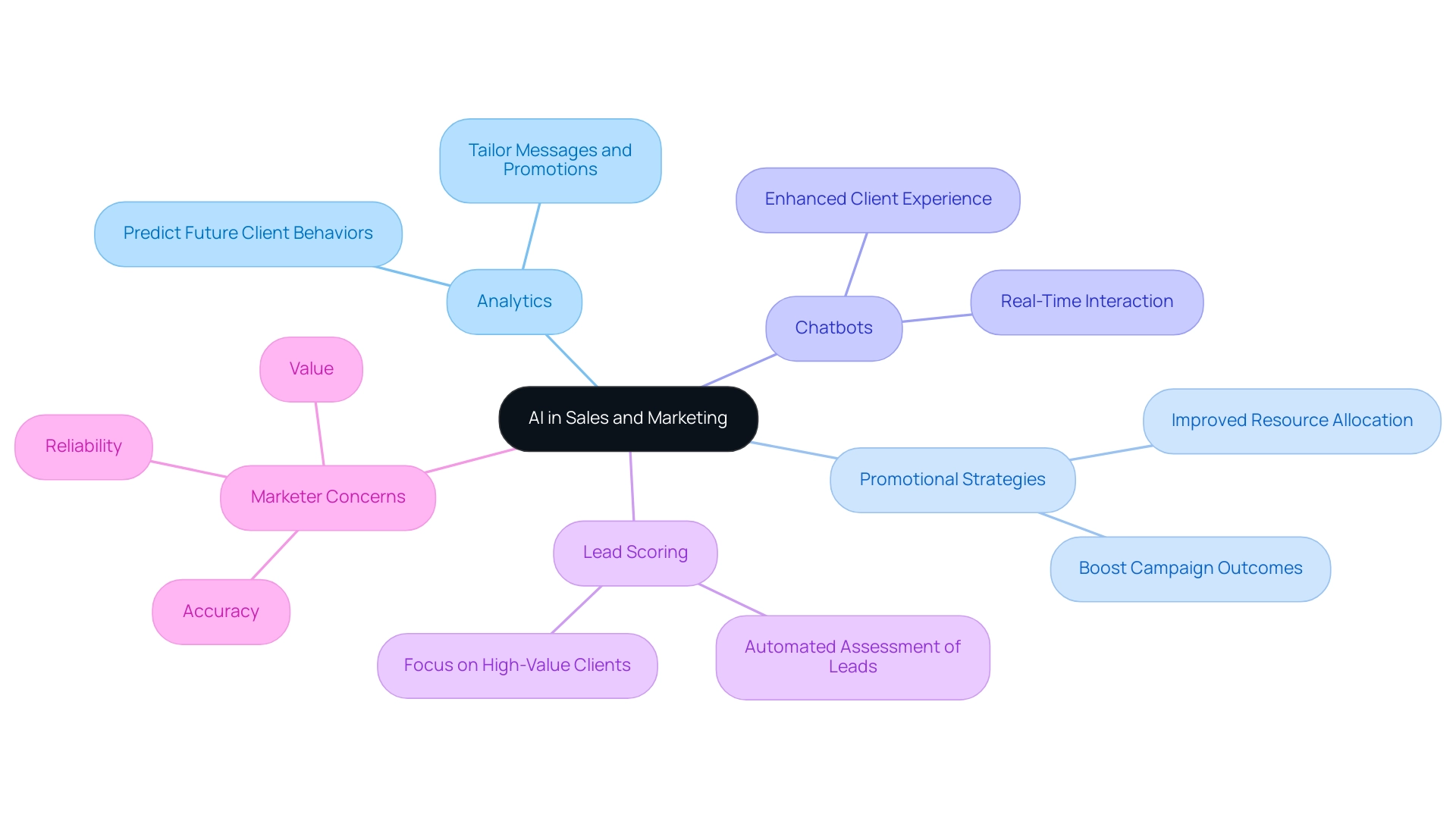
Enhancing customer engagement through AI-driven personalization
In today’s business landscape, AI isn’t just a nice-to-have; it’s a game changer. Companies are harnessing AI-driven personalization to sharpen their marketing strategies, tailoring them to fit the unique preferences and behaviors of each customer. Think of it as having a personal shopper for every client. By analyzing data from customer interactions, businesses can create bespoke content, personalized product recommendations, and highly targeted advertising campaigns. Look at Amazon — its AI suggests products based on what you’ve bought and searched for. That’s not just smart; it’s essential.
This approach to personalization doesn’t just boost engagement; it drives sales. In fact, 54% of salespeople in companies that aren’t leveraging AI struggle to grasp what their clients want. That’s a huge gap. When you consider that 56% of customers feel more inclined to buy when they receive tailored experiences, it’s clear that personalized interactions are no longer optional — they’re vital for building loyalty.
Sales experts pinpoint five critical areas where AI enhances effectiveness:
- Ensuring high-quality sales data
- Gaining insights into customer preferences
- Crafting personalized experiences
- Improving sales prediction accuracy
- Bolstering communication with prospects
When customers feel a brand understands and responds to their needs, they’re more likely to stick around. It’s about creating a sense of value and understanding — something that fosters long-term loyalty.
As Gustavo Schuler points out, even small adjustments in enhancing customer intimacy can provide a significant competitive edge. The more you adopt AI, the better your customization efforts will become, and the more favorable your results will be over time. This isn’t just about keeping up; it’s about staying ahead.
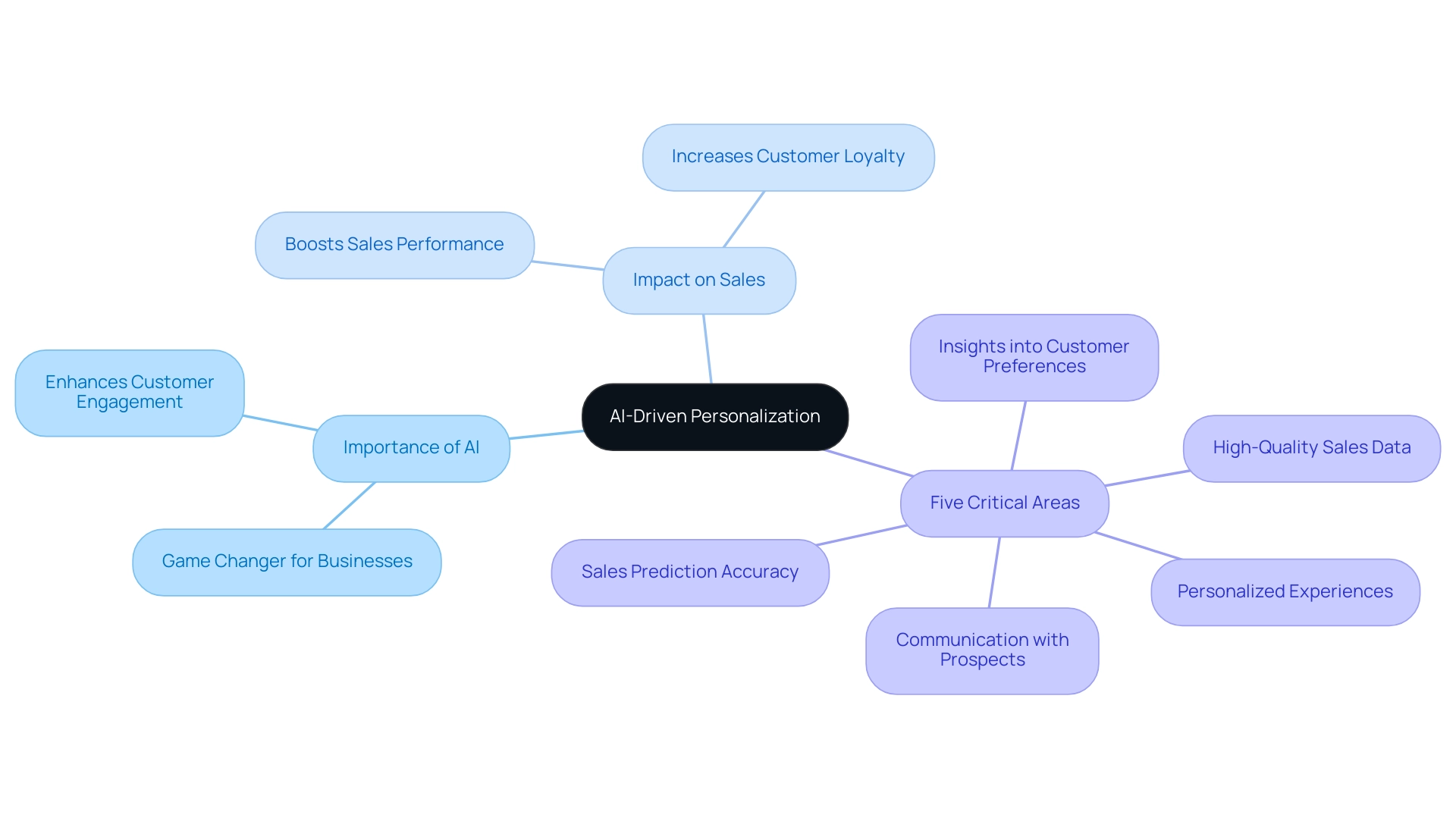
Navigating challenges: Integrating AI into sales and marketing
Integrating AI into sales and marketing isn’t just a nice-to-have; it’s a necessity. But make no mistake — this journey comes with its own set of challenges that organizations must face head-on. First off, there’s the issue of data privacy. You can’t afford to ignore the concerns about confidentiality and security. If your customers don’t trust you with their data, you’re dead in the water.
Then there’s the human element. Employees often resist change. It’s natural; people are wired to prefer the familiar. You need to address this reluctance upfront. And let’s not forget about the financial commitment. Implementing new technology isn’t cheap, and organizations need to be ready to invest.
Recent projections are eye-opening. By 2024, over 75% of businesses are expected to adopt AI tools. That’s a seismic shift. Even smaller teams — those with fewer than 1,000 employees — are getting in on the action, with 40% already leveraging AI for sales and marketing.
However, the road ahead isn’t smooth. Influencer Marketing Hub reports that 70% of marketers face technical difficulties with AI tools. Integration problems, compatibility issues, and a steep learning curve can derail your efforts. To successfully implement AI, you need to tackle these hurdles head-on.
The solution? Develop a clear strategy for AI that includes all key stakeholders in the decision-making process. Offer training programs that equip your team with the skills they need to make the most of these technologies. Address data security and compliance concerns rigorously. If you don’t, you risk losing client trust and running afoul of regulations.
Interestingly, 43% of marketers see AI as essential for their social media strategies. Why? Because AI enhances social media monitoring, providing valuable insights into customer sentiment and behavior. This isn’t just theory; it’s a practical application of AI that can significantly improve brand engagement.
As we look ahead, the AI industry is projected to grow to $300 billion by 2024. This growth underscores the urgency for organizations to prioritize data privacy regulations when integrating AI technologies. The risks are real, but so are the rewards. Embrace the challenge, and you’ll find that AI can be a game-changer for your business.
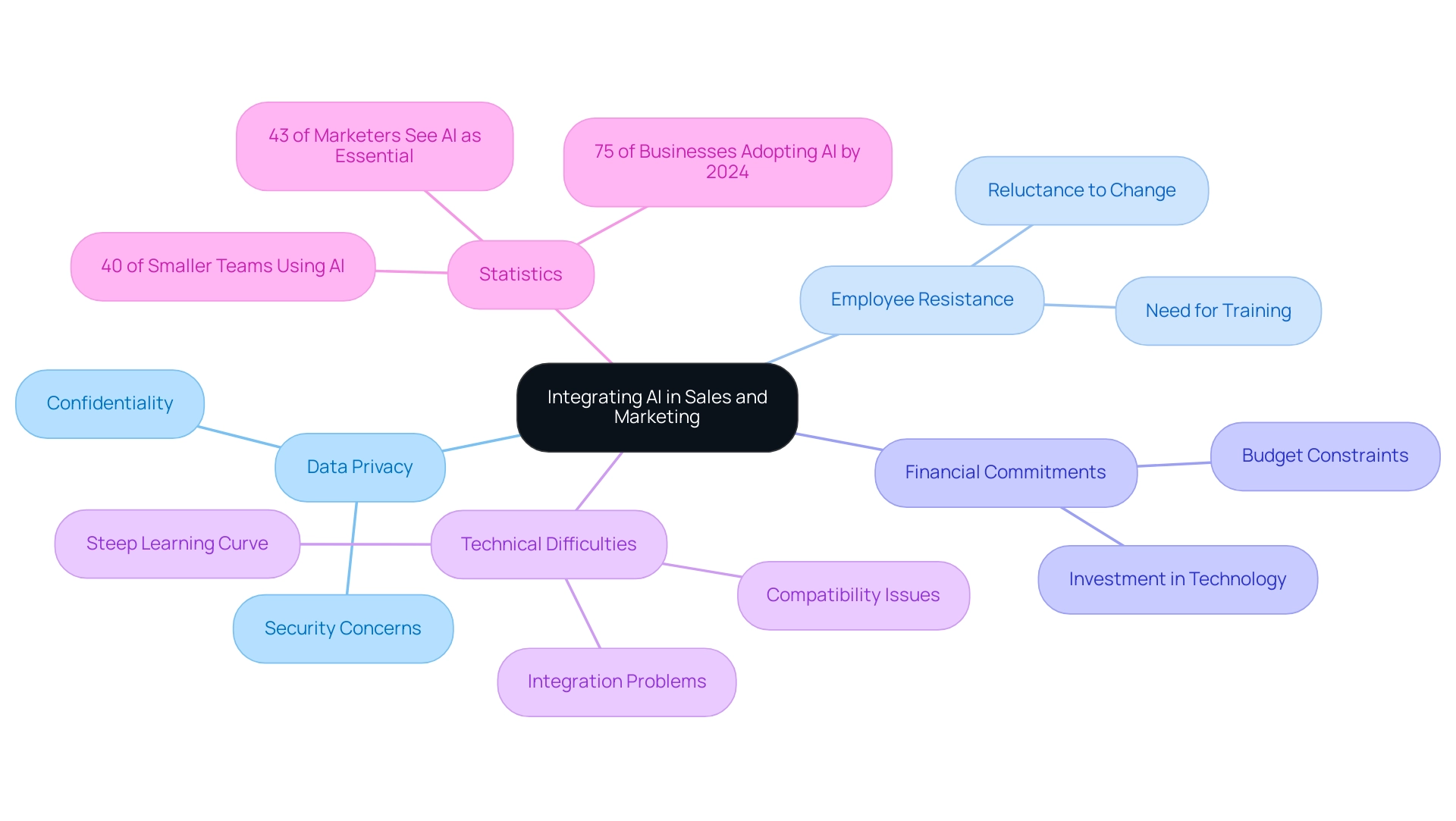
Future trends: The evolving landscape of AI in sales and marketing
The coming years are set to transform sales and marketing through AI as we approach 2024. Automation in marketing tools and enhanced data analysis capabilities are not just trends; they’re the future. About 40% of businesses with fewer than 1,000 employees are expected to adopt these technologies into their daily operations. If you’re not thinking about this, you’re already behind.
Voice-enabled searches are on the rise, and AI is changing how businesses engage with clients. Marketers are starting to wake up to this reality. Around 43% recognize AI’s importance in their social media strategies, while 48% see it as somewhat significant. This shift highlights a growing reliance on AI to track conversations and customer sentiments online more effectively.
Take the partnership between Adobe Express and Box as a case in point. They’re leveraging AI to enhance email marketing strategies. This is a real-world example of how technology can boost audience engagement.
Now, consider this: combining AI with cutting-edge tech like augmented reality and the Internet of Things (IoT) is set to reshape marketing strategies. This isn’t just fluff; it’s a fundamental shift in how companies connect with their customers. Industries like automotive are already reaping the rewards, pulling in over $170 billion in annual revenue.
For small business owners, it’s time to pay attention. The advancements in AI for sales and marketing present significant opportunities. Embrace these changes and think strategically about how automation can enhance your sales tactics. The future is here, and those who adapt will lead the charge.
Conclusion
Using AI in sales and marketing offers a chance for businesses to upgrade their tactics and enhance customer engagement effectively. With the help of advanced analytics tools, companies can get information about customer behaviors, which aids in creating more focused and successful marketing initiatives. Introducing chatbots and automated lead scoring also helps to streamline operations by assisting sales teams in prioritizing customers and boosting conversion rates.
Nevertheless, there are hurdles to overcome when integrating AI into operations. Companies need to manage worries related to:
– Safeguarding data privacy
– Overcoming employee pushback
– Making financial commitments for effective integration
Resolving these challenges is vital for optimizing the advantages of AI and preserving the company’s image while adhering to standards.
In the future, the changing nature of AI is poised to transform how businesses function. With automation and enhanced data analysis becoming increasingly common, companies that can utilize these advancements effectively stand to gain an advantage. The projected expansion of the AI sector highlights the significance of adjusting to these shifts and embracing strategies to meet customer needs.
In summary, for companies seeking success in a landscape, it is crucial to effectively incorporate AI into sales and marketing. By tackling obstacles and leveraging AI capabilities, businesses can improve efficiency, cultivate customer trust, and pave the way for long-term prosperity.




![4 steps as Chief Marketing Officer at a new company [Expert guide]](https://www.dashly.io/blog/wp-content/uploads/2022/10/4-steps-as-Chief-Marketing-Officer-at-a-new-company-Expert-guide-720x317.jpg)
![La guía definitiva de growth marketing [explicada por un growth hacker]](https://www.dashly.io/blog/wp-content/uploads/2023/04/The-ultimate-guide-to-growth-marketing-explained-by-a-growth-hacker-720x317.png)

